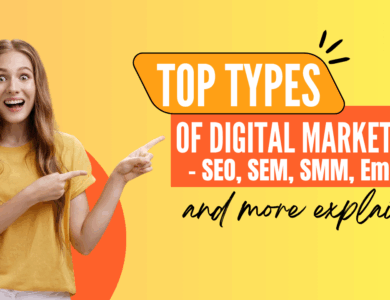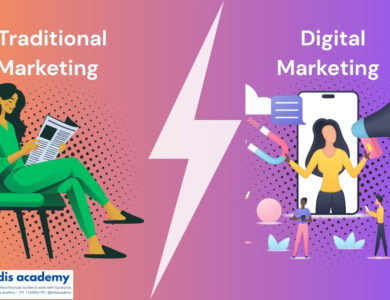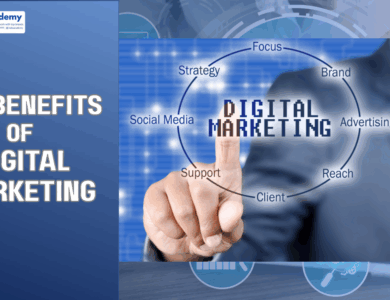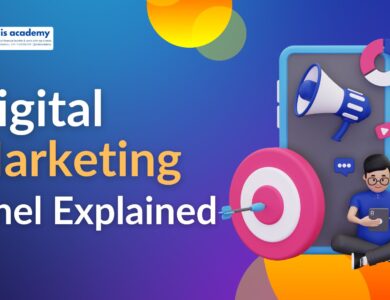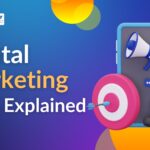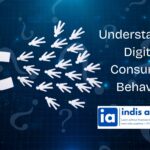How Digital Marketing Works: Complete Guide to Channels, Strategies & Platforms
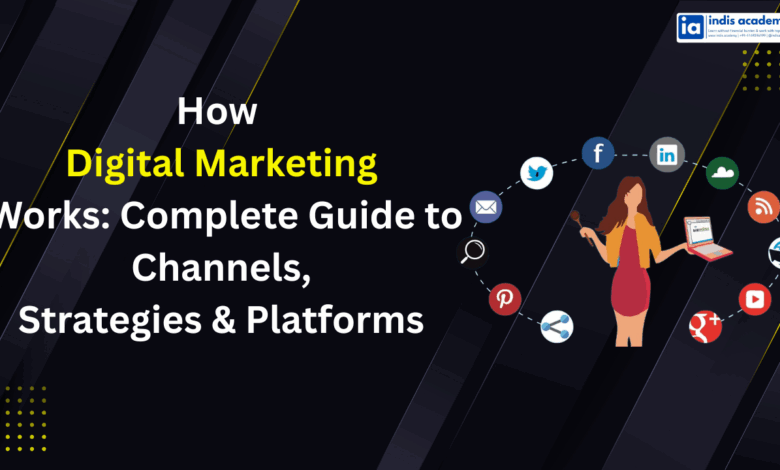
How Digital Marketing Works: Complete Guide to Channels, Strategies & Platforms
In today’s hyper-connected world, digital marketing isn’t just an option it’s essential. Whether you’re running a local business, launching a startup, or scaling a global brand, digital marketing is the driving force behind growth, customer engagement, and brand visibility. But how exactly does digital marketing work? What are the key channels, strategies, and platforms you should know about?
Let’s break it down in this complete and easy-to-understand guide.
What is Digital Marketing?
Digital marketing refers to the promotion of products or services through digital channels such as search engines, websites, social media, email, and mobile apps. It combines creativity, data, and technology to reach consumers where they spend most of their time: online.
Unlike traditional marketing, digital marketing offers real-time analytics, targeted reach, and measurable ROI, making it an indispensable tool for modern businesses.
Why Digital Marketing Matters
- Wider reach: Reach millions of people across the globe in seconds.
- Cost-effective: Much cheaper than traditional marketing campaigns.
- Targeted: Reach specific audiences based on interests, location, behavior, and more.
- Measurable: Track performance with clear metrics (clicks, conversions, engagement).
- Scalable: Start small and scale as your business grows.
How Digital Marketing Works (Step-by-Step Overview)
- Set Clear Goals
Whether it’s increasing sales, driving traffic, or building brand awareness, start with well-defined objectives. - Know Your Audience
Use customer personas, analytics, and market research to understand your ideal customers. - Choose the Right Channels
Not all channels suit every business. Pick those that align with your audience and goals. - Create Valuable Content
Content is king. Focus on delivering valuable, relevant, and engaging content. - Optimize for Search Engines (SEO)
Make your content discoverable through on-page and off-page SEO practices. - Run Paid Campaigns (PPC, Social Ads)
Amplify reach with Google Ads, Facebook Ads, LinkedIn, etc. - Track, Analyze, and Improve
Use analytics tools to monitor KPIs, learn what’s working, and make data-driven decisions.
Core Channels of Digital Marketing
1. Search Engine Optimization (SEO)
SEO helps your website rank higher in search engine results. It includes:
- On-page SEO: keywords, meta tags, content optimization
- Off-page SEO: backlinks, guest posting
- Technical SEO: site speed, mobile-friendliness, crawlability
2. Content Marketing
Focuses on creating and distributing valuable content:
- Blogs
- Infographics
- Videos
- eBooks
Content helps build trust, authority, and organic traffic.
3. Social Media Marketing (SMM)
Promoting content and engaging with users on platforms like:
- Twitter (X)
It boosts brand awareness and drives traffic.
4. Pay-Per-Click (PPC) Advertising
Paid ads that appear in search results or on other platforms:
- Google Ads
- Meta Ads (Facebook/Instagram)
- YouTube Ads
- LinkedIn Ads
You pay only when someone clicks.
5. Email Marketing
Still one of the most powerful channels:
- Newsletters
- Promotions
- Drip campaigns
- Personalized offers
Great for nurturing leads and retaining customers.
6. Affiliate Marketing
Partnering with affiliates who promote your products for a commission. It’s performance-based and scalable.
7. Influencer Marketing
Collaborate with influencers who have niche audiences. It builds trust and drives conversions fast.
8. Mobile Marketing
Reaching customers via mobile apps, SMS, or mobile-optimized websites. With more users on phones, this is vital.
Top Digital Marketing Platforms
- Google Ads – Best for search engine visibility. Includes Search, Display, and YouTube advertising.
- Meta (Facebook & Instagram Ads) – Highly targeted ads for both B2C and B2B businesses.
- LinkedIn Ads – Perfect for B2B lead generation and professional services.
- YouTube – Video marketing is booming. Great for tutorials, product demos, and brand storytelling.
- Mailchimp / ConvertKit / HubSpot – For email automation, campaign tracking, and CRM.
- SEMRush / Ahrefs / Ubersuggest – Essential SEO tools for keyword research, site audits, and competitor analysis.
- Google Analytics / GA4 – Track user behavior, conversions, and ROI with detailed insights.
Key Digital Marketing Strategies
- Omnichannel Approach: Ensure consistency across all platforms and devices.
- Personalization: Tailor content and offers based on user behavior.
- Retargeting: Show ads to users who visited your site but didn’t convert.
- Automation: Use tools to streamline email, social, and lead nurturing workflows.
- A/B Testing: Continuously test and optimize your campaigns.
- Conversion Rate Optimization (CRO): Improve landing pages and user journeys to increase leads/sales.
How Businesses Benefit from Digital Marketing
- Startups: Can compete with bigger brands using low-budget strategies.
- E-commerce: Can run high-conversion campaigns on Instagram and Google.
- Local Businesses: Get discovered through Local SEO and Maps listings.
- B2B Firms: Generate leads via LinkedIn and email funnels.
Final Thoughts
Digital marketing is dynamic, data-driven, and highly impactful when done right. Whether you’re a solo entrepreneur or a large enterprise, understanding how digital marketing works helps you make better decisions, reach your audience effectively, and maximize your ROI.
The key is not just to be present online, but to be strategic, consistent, and adaptive. With the right channels, platforms, and strategies, your brand can thrive in the digital age.
Want to master digital marketing for your business? Start with one channel, learn, experiment, and scale as you grow.
